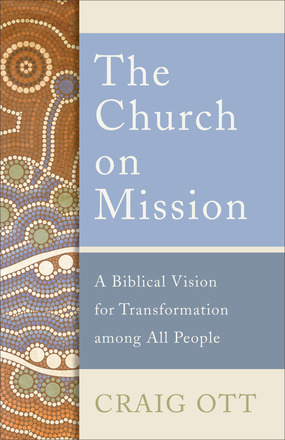‘What is the mission of the church?’ Craig Ott, professor of mission and intercultural studies at Trinity Evangelical Divinity School, addresses this vital question briefly but effectively in this short book. The six chapters grew out of a series of lectures Ott gave on the mission statement of the Evangelical Free Church of America, which reads: ‘The EFCA exists to glorify God by multiplying transformational churches among all people’ (ix). This statement clearly shapes the subtitle of the published lectures.
The aim of the book, according to Ott, is ‘to cast a clear and compelling vision for the mission of the church, rooted in an examination of key biblical texts’ (x). It is therefore a book that should be of interest to every Christian.
The titles and subtitles of Ott’s chapters provide a good indication of his approach:
- ‘Transformation to God’s Glory: The Source and Goal of Our Mission’;
- ‘Transformational Communities: The Church as New Creation of the Spirit’;
- ‘Transformation and the Word of God: The Power of Biblical Truth’;
- ‘Transformational Influence: Salt and Light in the Community and Beyond’;
- ‘Transformation for All Peoples: Barrier-Breaking Mission and Inclusion’; and
- ‘Transformation Through Multiplication: Filling the Earth with the Glory of the Lord’.
In his first chapter, Ott immediately and clearly explains his use of the term ‘mission’: ‘the overall purpose for which God sends the church into the world’ (2). Noting that the term ‘mission’ is related to the Latin word for ‘sending’, Ott explains,
God himself is a sending God, a missionary God, who sent prophets and angels as his messengers and who ultimately sent his Son as agent of his redemptive purposes in the world. Today he sends the church in the power of the Spirit as his people to further his mission of redemption and restoration. (3)
So, in line with much recent writing on mission, Ott strongly emphasises ‘the mission of God’ in the sense that God is the primary actor and director in mission: ‘God’s own mission’ (2).
Likewise, Ott provides a discussion of the definition of ‘transformation’. A transformational church, according to Ott, ‘is a church that effects change in individuals and communities so that they reflect more of the glory of God’ (15). Such transformation will reflect the ‘God’s glorious character: righteousness, justice, compassion, mercy, kindness, selfless love, and truth’ and ‘God’s glorious rule’ (15).
Throughout each of the chapters, the reader will find clear exposition of a variety of biblical passages with application to contemporary mission questions. Ott draws on the writings of key contributors to modern discussion of mission. The notes which follow each chapter provide good bibliographies to encourage further reading.
I commend this book to anyone who would like to think seriously about mission and who would prefer to start with a book of modest length.
This book is available to purchase from Book Depository.
Alistair I. Wilson, ETS

